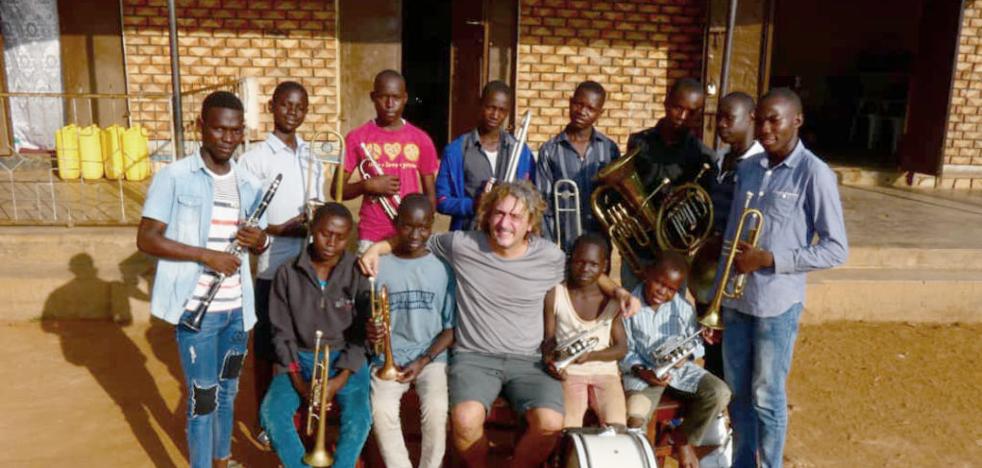That music crosses borders is something that the human being already knew. It’s harder to imagine a band playing ‘Lau Teilatu’, ‘Euskal Herrian Euskaraz’ or ‘Txoriak Txori’ in a remote area of Africa. It all started when David Orduña, a Navarrese music teacher, volunteered a few years ago to Iganga, a Ugandan town of about 550,000 inhabitants. There, the NGO with which it collaborates, ‘Destino Uganda’, has a project in the music school ‘Iganga Community Brass Band Music School’, which works for recover the children who live on the streets and help them to redirect their lives through music. “The gang provides them with a roof, food, health care and a future. Many happen to be on the street sniffing glue to being professional musicians. They cling to life through the instruments», Explains Orduña.
This Navarrese professor took advantage of his visit to spread the Basque songbook throughout Ugandan lands, which at the same time helped him to publicize the project of this NGO in the Basque Country. «In Iganga, children often play music from military bands. But for as long as I was we focused in learning songs for other audiences, with the aim of making the project more visible. Since my visit was during Christmas, we decided to record ‘Basque in the Basque Country’ and that people could congratulate themselves on Christmas with that video. It was a success, so also we are encouraged to play ‘Txoriak Txori’ and ‘Lau Teilatu’ », remember.
‘Birds Birds’
The project has been evolving and, six years later, it is more than a music school. Attend to 70 young people with a hard past behind them, of which 20 live in the band’s facilities. «The key is in the time they dedicate to music. There is no television, no internet, no video games, and that allows you to focus much more on learning new instruments and rehearsing. In addition, they work with the motivation and gratitude that music has been the way out of the street. They have a lot of talent, you give them any instrument and they do wonders ”, the Navarrese musician says excitedly.
‘Basque in the Basque Country’
Orduña has visited the center up to four times. In his travels he has met hundreds of young people, but if he had to choose a special case for him, it would be that of John Susi Mpandi, one of the creators of this project. «Mpandi was a ‘street boy’ about 50 years ago, Troubled times in Uganda, with thousands displaced across the country. He was rescued by a group of missionaries who welcomed him into a community »with more children, where they were guaranteed food and education.
One of the missionaries had musical knowledge and «saw him from the first moment a special talent to John, so he convinced his congregation to they will pay for music studies. He did so well that he ended up as a teacher at the conservatory in Kampala, the country’s capital. Not happy with that, He saved money by giving classes and concerts and came to Europe to later graduate in conducting in the Netherlands ».
But Mpandi He did not intend to get rich, but to lead by example that saved him from the street. «He gave up the life of comfort that Europe offered him, to return to his country and give other children the opportunity that life had given him, and this is how he formed the project ”, concludes Orduña.
– .


